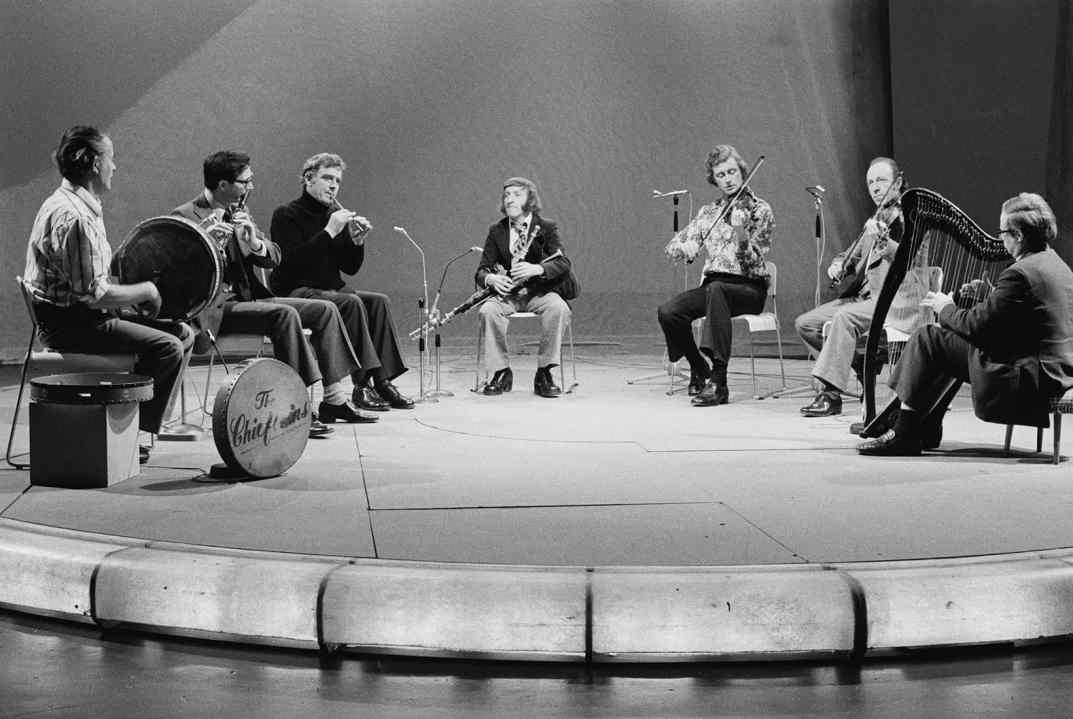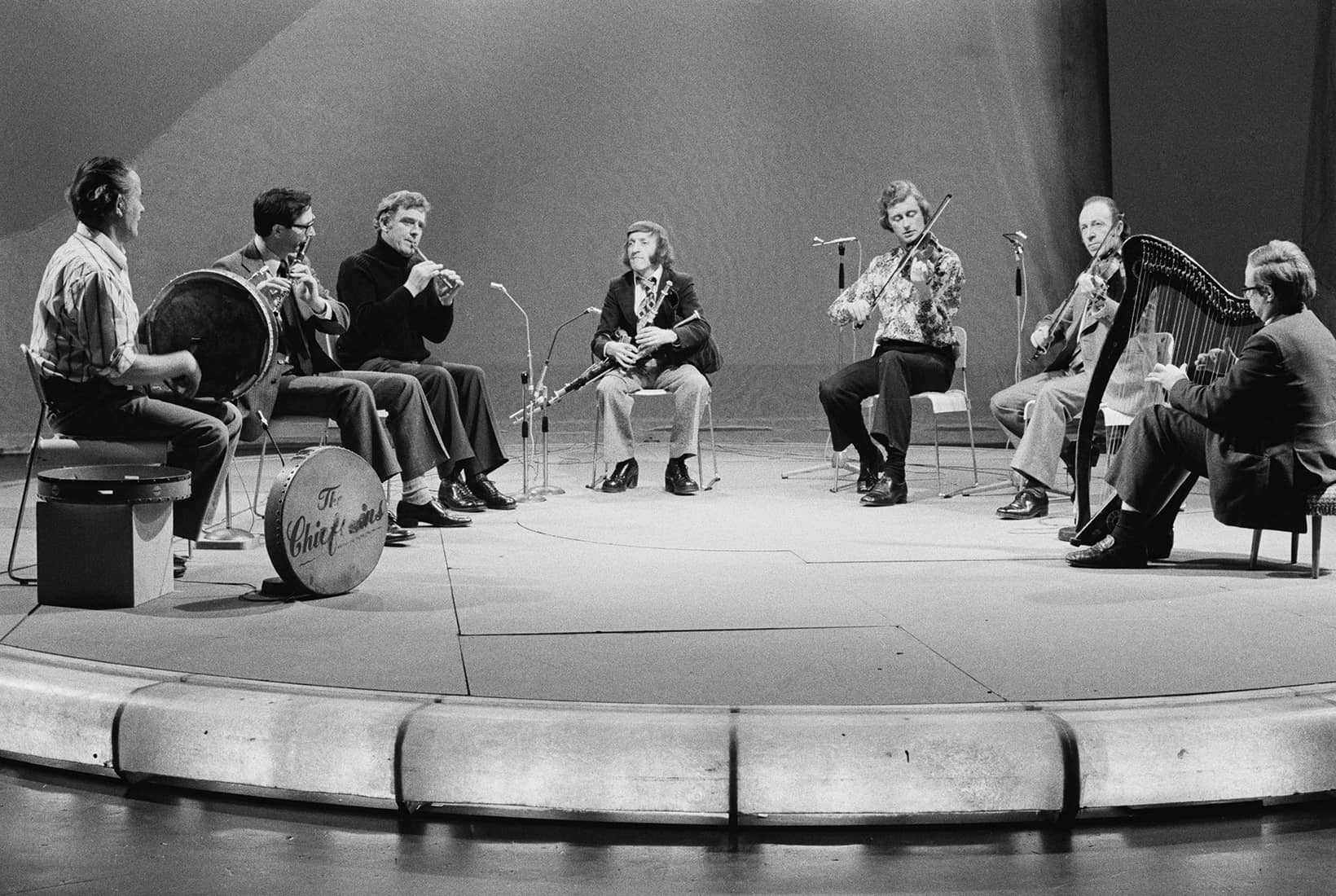Pop quiz time: which act was named Melody Maker Group of the Year in 1975? The answer is not, as you might expect, some testosterone-fuelled blues-rock outfit or a hip gang of proto-punk gunslingers, but a gaggle of semi-professional Irish musicians who performed trad tunes sitting down, dressed for church in cardigans, sensible shoes, shirts and ties.
The Chieftains were so far from rock and roll they met it coming back the other way. On the cover of Irish Heartbeat, a later collaboration with Van Morrison, they could be mistaken for a loose affiliation of farmers, minor office clerks and earnest ornithologists waiting for a bus outside the town hall. It was a brilliant disguise. The Chieftains wore their radicalism lightly, but radical they were.
The Chieftains wore their radicalism lightly, but radical they were
A new double compilation album and DVD, Chronicles, explains (almost) all. Celebrating 60 years of covert boundary pushing, it might lean a little too heavily on starry collaborations — a gratuitous Jagger here; a flagrant Paolo Nutini there — but it is nonetheless a solid overview of the band’s long reach, although sadly what was intended as a celebration has become a eulogy. Paddy Moloney, the Chieftains’ talismanic whistle player, uilleann piper, founding member and leader, died last month at the age of 83. Moloney was the twinkling maypole around which a slowly revolving cast of exemplary musicians twirled. Now, only two long-standing members remain: Kevin Conneff and Matt Molloy, relative newcomers both, having joined in the mid-1970s. The last leg of the Chieftains’ farewell Irish Goodbye tour was postponed in March last year due to Covid. You wonder whether it will ever conclude.
The Chieftains formed in 1962, and the albums they recorded between 1964 and 1980, helpfully titled Chieftains 1-10, changed the nature of the relationship between Irish traditional music and the wider world. The group took rural jigs and ancient airs to symphonic halls and opera houses. Blending flutes, fiddles, harp, whistles, pipes and bodhran, their genius was in allowing each specialised instrumentalist the space to shine, but only within a greater, more unified context. Without ever coming close to folk-rock or fusion, the Chieftains reclaimed and modernised an entire repertoire of Irish tunes.
Chronicles has its share of rumbustious reels and marches, but the standout moments more closely resemble the work of a chamber ensemble. Perhaps their finest album, Chieftains 4, released in 1973, includes a landmark recording of Sean O Riada’s ‘Mna na hEireann (Women of Ireland)’, while the addition of Northern Irish harper Derek Bell brought compositions by 17th-century composer Turlough O’Carolan within their reach.
The rich instrumental blend and delicate arrangements aligned the band more closely with pioneering folk artists such as Pentangle and the Incredible String Band than the Dubliners, so it’s perhaps unsurprising that they drifted into the hippie orbit. Many a reefer was smoked down to the roach to the sound of the Chieftains. John Peel was an early champion: starting in 1970, they taped five live sessions for Peel’s Top Gear radio show. ‘Eibhli Gheal Chiun Ni Chearbhaill’, recorded on Chieftains 3, was later covered by John Martyn, while their old-world demeanour made them an almost exotic incongruity at pop festivals.
By 1975, as the Melody Maker accolade suggests, they were approaching rock-star status. Stanley Kubrick drew on Chieftains 4 for the soundtrack to Barry Lyndon. Playing traditional music was hitherto regarded as a recreational pursuit, remunerated in liquid assets rather than loot. Now, to borrow a phrase from Hunter S. Thompson, the weird turned pro. A sold-out show at the Royal Albert Hall was the final spur in the decision to ditch their day jobs. By the end of the year the Chieftains had signed to Island Records, becoming label-mates of Bob Marley, King Crimson and Roxy Music.
It was Moloney who most enthusiastically led the band into more mainstream territory. The Chieftains later recorded with everyone from Pavarotti to Dolly Parton, Stevie Wonder to the Muppets. Themed albums explored connections between Irish music and the sounds of Breton, Galicia, Mexico and the American south. At times, these links were stretched almost beyond musical credulity; Moloney was notorious for hearing the Irish in everything. When the Chieftains toured with a group of Mongolian throat singers, he stated confidently that he detected ‘the rhythms of an Irish jig’ in their music.
The shift from innovators to a more ambassadorial role didn’t always best serve the music, but Moloney was a canny frontman, happy at times to play the leprechaun and irk the purists if it meant that more people would listen. It worked. The world came to the Chieftains just as readily as the Chieftains went to the world. These gentlemen players took the pub session to international concert halls. What could be more radical than that?
Chronicles: 60 Years of the Chieftains is out now on Claddagh Records.







Comments